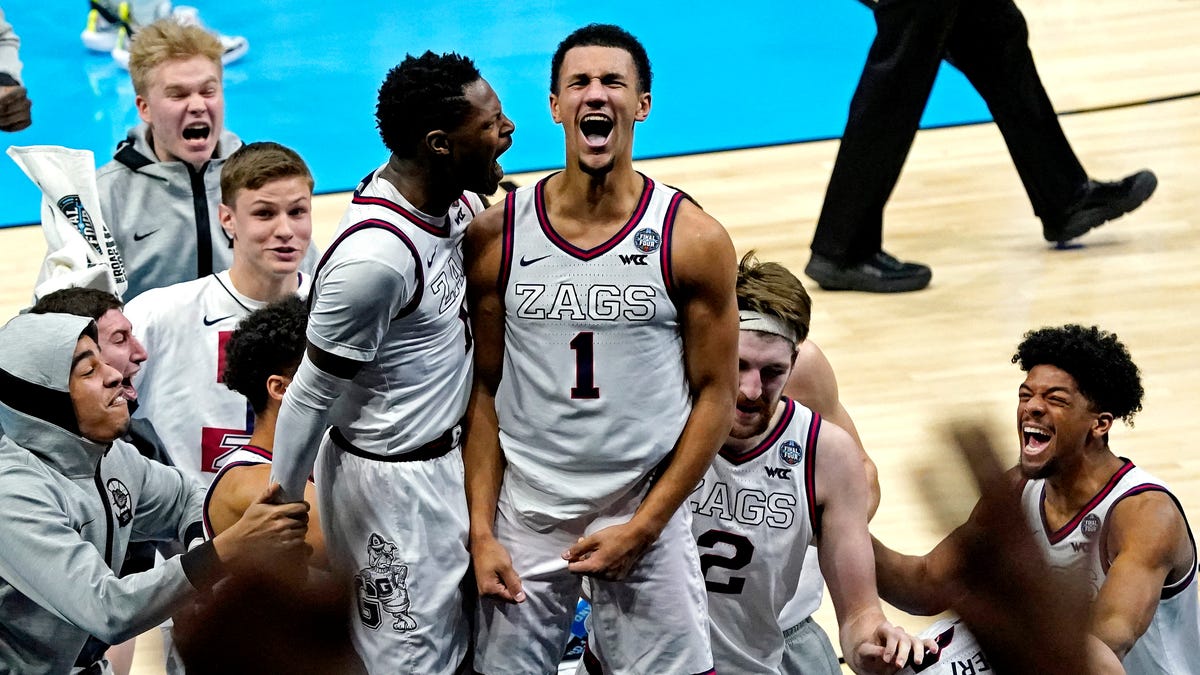Legendary Duke coach Mike Krzyzewski to retire after upcoming season
Sports Pulse: USA TODAY Sports’ Dan Wolken reacts to the news that Duke men’s basketball coach Mike Krzyzewski will retire after the 2021-22 season.
SportsPulse, USA TODAY
Where does Mike Krzyzewski rank among the group of other great coaches in the history of men’s college basketball?
It’s a good time to take stock of that question and legacy of the Duke coach with the announcement Wednesday that he will spend one more year on the Blue Devils’ bench before heading to retirement.
It’s not an easy exercise as all the candidates have had long and successful runs on the sidelines that led them to national titles and multiple Final Fours. They’re also from different eras when tournaments were smaller and getting an invitation was more difficult.
A look at the 10 best coaches of all-time:
1. Mike Krzyzewski
Accomplishments: 1170-361 record, 12 Final Fours, five national titles
The records are staggering. Tied for the most Final Fours. The most wins all-time. Most tournament appearances (35) and tournament wins (97). Fifteen ACC tournament championships. The sustained excellence of more than 40 years at Duke is what separates Coach K from everyone else, especially in an era when parity has been greater and advancing in the postseason is more difficult. One of his greatest strengths has been his adaptability as he built rosters that changed with the times during six decades (he spent five seasons at Army from 1975-80). For his first two decades at Duke, he built tough-minded teams that succeeded with defense and roster continuity. None of his players left early for the NBA before the 1999 season. He transitioned during the middle of his career to taking players that likely would depart before their eligibility was up to a full embrace of a one-and-done model as the Blue Devils became a magnet for the best recruits in the country that wanted a short stay before professional basketball.
COACH K: ‘My family and I view today as a celebration’
FTW: Six stats show how amazing Coach K’s career has been
OPINION: No one will ever do it better than Mike Krzyzewski, writes Dan Wolken
2. John Wooden
Accomplishments: 664-162 record, 12 Final Fours, 10 national titles
It’s easy to forget as memories fade and generations change that UCLA was an unstoppable force in the last 12 seasons of Wooden’s career before he retired in 1975. Wooden’s teams won 10 championships in that span and during seven seasons between 1966-73 lost just seven games and had a record 88-game winning streak. The program featured some of the game’s greats — Kareem Abdul-Jabbar (then Lew Alcindor), Bill Walton and Gail Goodrich. His numbers would have been higher had he not walked away at 65, though it is worth noting the NCAA field was much smaller in his time — between 23 and 32 teams — and making the Final Four required as few as two wins.
3. Adolph Rupp
Accomplishments: 876-190 record, six Final Fours, four national titles
Rupp spent his entire 41-year career at Kentucky, creating one of the preeminent programs that has maintained its status among the elite for almost 50 years since he stepped down. When he retired in 1972, he was the Division I leader in career victories. The record stood for almost three decades until Dean Smith passed him in 1997. He ranks among the top five in career winning percentage (.822) and national championships.
4. Roy Williams
Accomplishments: 903-264 record, nine Final Fours, three national titles
What’s unique about Williams is that he won more than 400 games at two schools — Kansas and North Carolina — something no other Division I coach has done. And while his mentor Dean Smith got more notoriety with the Tar Heels, it was Williams who achieved more — first with the Jayhawks before eventually heading back to Chapel Hill, where he won his three titles and moved to third in career wins and second in tournament victories (79) before retiring in April.
5. Dean Smith
Accomplishments: 879-254 record, 11 Final Fours, two national titles
It’s hard to think of a coaching career with so many accomplishments as unfulfilling, but it’s still baffling that Smith only won two championships in his 36 seasons with the array of talent he had at North Carolina. Among the greats who made the Tar Heels the most dominant team in the ACC were Michael Jordan, Phil Ford, Sam Perkins, James Worthy and Antawn Jamison. Yet the Tar Heels only cut the nets down during two of their 11 Final Four appearances under Smith. An innovator, he popularized the use of the four corners offense that dominated possession late in games, leading to the advent of the shot clock.
6. Bob Knight
Accomplishments: 902-371 record, five Final Fours, three national titles
A unique character from an era that won’t likely be seen again, Knight made as many headlines for his court demeanor and controversial statements as his coaching success. That shouldn’t overshadow his overwhelming achievements that were based on disciplined offense and physical defense that started during his time at Army. His tenure at Indiana includes three championships, including the last unbeaten national team, in 1976.
7. Jim Calhoun
Accomplishments: 877-382 record, four Final Fours, three national titles
After making Northeastern into a tournament regular, Calhoun achieved one of the great successes in college basketball in building Connecticut from a low-level Big East program into a national powerhouse. His first title came at the expense of one of Krzyzewski’s best Duke teams in the championship game. He won two more to place him with Williams and Knight in a tie for fourth for the most titles in a career. After retiring in 2012 due to health reasons, he has been back coaching Division III University of St. Joseph’s (Connecticut) and has totaled 44 wins in three seasons.
8. Rick Pitino
Accomplishments: 659-277 record, five Final Fours, one national title.
No great college coach has had a more colorful career than Pitino. In between taking a record five schools to the tournament, he also had tenures in the NBA with the Knicks and Celtics. His defining move came when he left the Knicks to take over Kentucky in 1989 with the Wildcats facing a two-year tournament ban. It was the ultimate rebuilding job that had Kentucky in the Elite Eight in his fourth season before a memorable loss to Duke. He won a national title in his seventh season and one year later was off to the NBA again. Pitino returned to college in 2001 at Louisville — his former school’s biggest rival. He left in 2017 due to an NCAA scandal at the school that would wipe out 123 wins, two Finals Fours and one national title from his ledger. Last season, he resurfaced with Iona and immediately led the Gaels to the tournament.
9. Jim Boeheim
Accomplishments: 982–409 record, five Final Fours, one national title.
Perhaps no coach is as synonymous with his school as Boeheim. While Kryzyzewski will walk away after this 42nd season at Duke, Boeheim is set to enter his 46th season as the head coach at Syracuse after playing and serving as an assistant coach for the Orange. Boeheim navigated Syracuse through the golden era of the Big East before the school moved to the ACC, a switch that likely never happens without him establishing the Orange as a basketball power. His longevity would put him in range of Krzyzewski’s all-time win total, but he had 101 vacated by the NCAA for rules violations.
10. Denny Crum
Accomplishments: 675-295 record, six Final Fours, two national titles.
Easily the quietest member of this list, Crum cut a stoic figure on the sideline as he stood with a rolled-up program in his hand, a practice he took from his time as a player and an assistant with Wooden at UCLA. He left Westwood for Louisville in 1971 and immediately led the Cardinals to their second-ever trip to the Final Four. His overall win total lags behind other greats partly due to his late start as a head coach — he was 44 when he took the Louisville job — and a unique practice of scheduling difficult non-conference games to prepare his team for the tournament. The philosophy worked through the 1970s and ’80s as the Cardinals consistently made deep runs in March, including titles in 1980 and 1986.
Follow colleges reporter Erick Smith on Twitter @ericksmith







